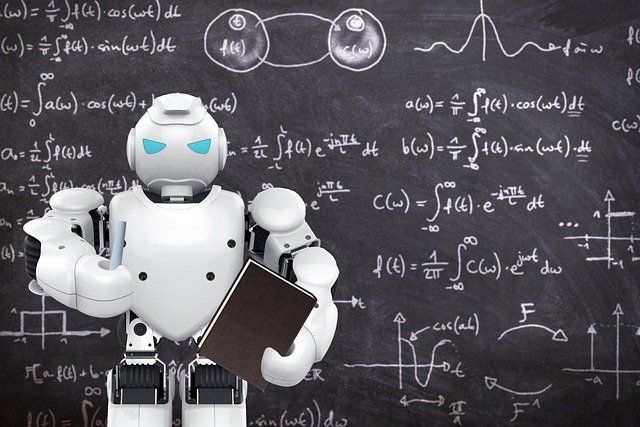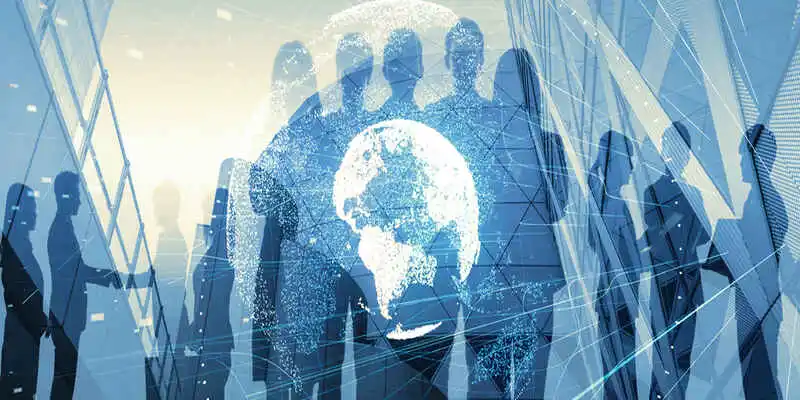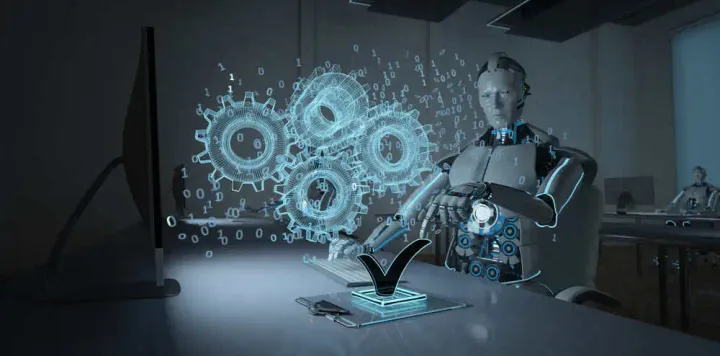Artificial Intelligence Benefits to Society
Adoption of AI in society necessitates technological awareness among local populations. AI and machine learning will continue to develop as computing power grows and big data plays a major role. The benefits of artificial intelligence to society also include personalized healthcare solutions.

Broadly, there are three building blocks of society: humans, industries, and government. Any new technology regarding AI, robotics, and automation move around these fields. Artificial intelligence brings outbreaking techniques from early diagnosis of deadly diseases, education, and emotion to transportation, agriculture, and micro-sized robots. Here the questions arise:
What will be the effects of these changes on society?
How do humans manage all the challenges coming in the way of artificial intelligence, ethics and society?
1. ARTIFICIAL INTELLIGENCE MARKET SIZE AND GLOBAL IMPACT
The new world is powered by 5G technology to benefit from artificial intelligence in improving society. Plus, it will evolve the human workforce causing of loss of jobs for humans. According to PwC, in the UK, AI will replace humans for about 7 million jobs from 2017 to 2037 with 7.2 million jobs creation. Moreover, McKinsey reported that big data could save pharma and medicine about $100 B per year. Positive impacts of artificial intelligence will include providing patients with extraordinary, personalized healthcare solutions. A project by PriceWaterhouseCoopers calculated that AI techniques will increase GDP to $15.7 trillion globally by 2030.
A major chokepoint in adopting and implementing AI in society is the shortage of experts in every domain. Successful implementation of AI in society requires the general awareness of technology among residents of an area. Rapid computing power and the significant role of big data will make AI and ML improve continuously.
2. ARTIFICIAL INTELLIGENCE ETHICS AND SOCIETY
Three important principles to design algorithms and practical guides according to Belmont Report is, given as:
2.1. Respect for Humans: The principle identifies individual sovereignty and uploads a wish (expectations) for researchers to protect individuals with lessened autonomy. It might happen for several reasons, including illness, a mental disorder, or age limitations. Individuals must be aware of the benefits and risks regarding any experiment in which they are involved and can also be allowed to withdraw their participation at any time during the experiment.
2.2. Beneficence: This principle represents a similar fact when doctors take an oath to "no harm to the patient." In artificial intelligence, algorithms are developed without discrimination of gender, race, and political parties with the attention to do good for others with improved systems.
2.3. Justice: This principle is to tackle issues regarding fairness and equality. The report offered five ways to distribute risks and benefits of AI in society as equal share, individual need, societal contribution, individual efforts, and merit.
It has become necessary to consider how organizations and social media are using our data recently with advanced technologies. Artificial intelligence benefits to society (human-centric approach) can be explained via several factors discussed below.
3. ARTIFICIAL INTELLIGENCE BENEFITS TO SOCIETY
Some factors to consider regarding implementing AI are given as:
3.1. AI Reduces Human Error Consequences
Humans are more prone to commit mistakes in various situations, including weather forecasting and misprinting results of a technical study. In contrast, artificial intelligence and automation do tasks at their best probability of happening with lesser chances of error than humans. Plus, AI is free from stress and fatigue issues that are common reasons for error-causing human decisions. Adding AI in systems helps higher productivity, increases safety, and reduces time consumption.
3.2. The Benefits of Artificial Intelligence in Financial Systems
3.2.1. AI in Trading
AI is revolutionizing the trading sector, and its best example is the use of AI in the stock exchange. Humans use highly accurate machines for decision making replacing humans. People buy and sell deals, and intelligent systems match them in moments without human help. Machines are highly efficient at spotting trading inefficiencies and failures of the market on a very small scale. Also, these behave following the investor's instructions and execute trades for making money. These tools can also store vast amounts of information with advanced computing programs, focusing on quantum bits. It increases storing capacity with reduced processing time eventually.
Fraud detection is another application of AI in improving society. Sometimes, it seems complicated to deal with fraudulent activities in organizations. Here, AI helps identify outliers, abnormalities, and cases to investigate more profound than conventional probing methods.

3.2.2. Positive Effects of Artificial Intelligence on Jobs
Most people think that the success of Artificial intelligence results in job loss; this concept must be changed. Market job roles shift with the evolution of every disruptive technology. For instance, giant manufacturers like GM are on green initiatives and shifting their focus on vehicle production in the automobile industry. The industry changed its energy source to move from fuel to electric economy. Similarly, artificial intelligence opens doors to new jobs; there is a need for domain experts to deal with these systems in solving complex industry problems.
Different industries apply intelligent solutions to get the economic benefits of artificial intelligence; it boosts their sales, detects fraud, and improves customer experience. Their efficient systems will offer novel opportunities to generate high revenues and ultimately give rise to a new job market. Also, AI helps companies automate their tedious and repetitive tasks with high creativity and skill. AI systems don’t get bored off doing work in a similar pattern.
3.3. Impact of Artificial Intelligence on Business: Better User Experience
AI helps improve the user experience that ultimately enhances the chances of repetitive visits. AI searches for the terms regarding a specific business or query that people probably look for on search engines. In this way, it helps buyers and sellers get potential clients by optimizing their websites and client to get a response to their desired query for a product/service faster.

AI also suggests similar products based on their last or previous order to the buyers. It engages buyers to the eCommerce website longer and ultimately generates more orders than usual (also helps sellers get similar products like toothpaste when buying a brush to get items from one place with east struggle). All these benefits answer that why is artificial intelligence important to business!
3.4. Ethics of Artificial Intelligence in Healthcare
Artificial intelligence help humanity with numerous applications improving healthcare and the availability of multiple medical apps. These services help diagnose disease and also prescribe the proper medication and treatment. The user only shares their symptoms and medical history with the app and gets exceptional results. The science behind these platforms is their training based on several volumes of medical content that ultimately help diagnose accurately.
3.5. AI For the Benefit of Government
3.5.1. National Security
AI offers extraordinary national security services. The US armed force uses artificial intelligence in the Project Maven, according to Deputy Secretary of Defense Patrick Shanahan, “to sift through the massive troves of data and video captured by surveillance and then alert human analysts of patterns or when there is abnormal or suspicious activity. To meet out warfighters’ need and to increase the speed and agility of technology development and procurement.”
Artificial intelligence and big data will influence analysis process in sifting significant amounts of data instantly. Systems tied with artificial intelligence command and run systems can do decision-making at an extraordinary speed than traditional waging war speed.
AI provides facial recognition services in countries to trace person-to-person information in national security services. AI continues improving living through its services in the government sector. A well-known saying is that AI will end humanity as robots and machines will replace it. But its optimistic side is ignored mostly; AI is the future war weapon. According to the book "Army of None” by Paul Scharre, AI is a promising technology in war. Machines intelligence and militaries will involve in fights; robots take on the dangerous on-line role, saving living life from the battle line.
3.5.2. What are the Benefits of Artificial Intelligence in Natural Disaster Prediction?
Tornadoes, floods, earthquakes, and other natural disasters happen suddenly and leave citizens no time to save their property and lives. These disasters have a considerable impact influencing millions of people globally with prolonged recovery periods. California faced a vast disaster due to wildfires and reported burning over 1 million acres of land, lost 46 lives, and severe property loss in 2017. Australia also faced wildfires between 2019 and 2020, resulting in significant damages to lives and lands.
Artificial intelligence cannot control these disasters, but people can be aware by predicting with high accuracy. Due to these increasing natural threats, governments strive to introduce AI to fight through algorithms and satellite data. It is also forecasted that deep learning will soon become efficient enough to be integrated with tragedy simulations to get excellent responsive techniques.

Google developed a deep learning network via collaboration with Harvard researchers to be “significantly more accurate” than present systems at forecasting the earthquake aftershock location. Moreover, another intelligent system was developed by AI experts named flood forecasting to locate locations earlier.
Another significant feature of artificial intelligence that benefits society is predicting wildfires. An interesting study is “how the National Oceanic and Atmospheric Administration monitors populations of endangered species in the polar areas, including beluga whales, polar bears, and ice seals”. The researchers used camera-supported airplanes in their study. WildTrack tool was used for tracking (non-invasive) endangered species via photographs. Scientists analyzed these images for measurements and identified the species, sex, and individual age.
Weather forecasting is another complex issue where artificial intelligence benefits society. It comes with intensive deep learning and computing solutions that empower machines to scan big data faster than humans. In recent years, rapid growth can be seen in the weather forecasting sector known as "Climate Informatics," which connects data scientists with climate researchers reducing the gaps in understanding and predicting weather changes. IBM introduced IBM’s GRAF System to enhance the potential of intelligent systems further.
3.6. Positive Impacts of Artificial Intelligence in Improving Education Sector
Every child has different learning and knowledge absorbing power, and teachers cannot teach every student of class at their understanding level. One of the artificial intelligence benefits to society is improving the education system. Technology expert Ray Walsh at ProPrivacy said:
“This can allow all students to get constant, personalized torturing based on their needs.”
There is still potential of creating highly tailored session schedules to save teachers time to focus on administrative tasks. Excitingly, it should also provide education to children despite their living location and situations. He added:
“AI has the potential to democratize education by providing world-class education regardless of where students reside.”

3.7. What are the Benefits of Artificial Intelligence in Transportation?
AI has already had a significant impact in the automobile industry as it offers voice control commands to drivers. It also helps them not be distracted from the path with reduced chances of accidents. AI-powered vehicles use machine learning algorithms to detect drowsiness, hard acceleration, cell phone use, or rash driving immediately with driving alerts. Hence, it observes their behavior and shares instructions in real-time with audible and visual signals; public transport becomes accessible, reliable, and efficient for everyone.
3.8. Preventing Violence Acts
Expert solutions are active in saving innocent lives when the world is in preparation for World War III. Chief security office Jon Knight at Fortified Estate said, “While there may be backlash over the security use of AI for facial detection, in light of recurring mass shootings, their use in assault rifle detection is largely seen as a major gain.” Artificial intelligence provides real-time security by recognizing firearms, unlike security personnel who might be absent at that time.
“The benefit is being able to detect openly held large firearms would allow crucial seconds of lockdown, emergency calling, or other forms of protection that can save numerous lives like, for instance, soon door locks will be able to automatically engaged when this sort of presence is detected outside, where laws prohibit firearms on school properties.”
4. ARTIFICIAL INTELLIGENCE ETHICAL BOOKS ON AMAZON
4.1 AI Ethics (The MIT Press Essential Knowledge Series)
Author: Mark Coeckelbergh
Description: The book explains leading AI narratives, singularity, and technology of AI and ML with data science. He discussed significant ethical issues, including privacy, security, and transparency. Further, the challenges faced by policymakers are explained for better life and security.
Click to Check Price

4.2 Ethics of Artificial Intelligence
Author: S. Matthew Liao
Description: The book is set into four sections. The first section covers issues regarding challenges in building ethics in machines. It is an incredible source to get an idea about AI ethical issues and new studies for AI development in the future.
Click to Check Price

4.3 Artificial Intelligence for Society
Author: Karamjit S. Gill
Description: This book offers a critical review of artificial intelligence and IT developments and the challenges are faced by technological society. The author provides real-life examples and solutions to complex problems mentioned.
Click to Check Price

4.4 How Artificial Intelligence will Impact Society (Technology’s Impact)
Author: Christa C Hogan
Description: It analyzes the improvements in artificially intelligent systems and studies the science behind its operations. Moreover, it explains how AI will reshape the future with its advanced, potentially strong system.
Click to Check Price

4.5 AI in Society: Interviews on AI
Author: William Wei
Description: AI is continuously impacting society with its potential benefits and risks. The book discusses whether AI is the final technology that can bring improvement to human society. Several experts and laypersons were interviewed in this book to check how people think about AI in society.
Click to Check Price

5. CONS OF ARTIFICIAL INTELLIGENCE
5.1. Data Protection, Biasness, and Discrimination
Significant data influences in three ways as volume, variety, and velocity. Massive relevant data (volume) results in drawing better analysis and ultimately better decision making. Variety uses big data information to forecast relevant features' future. At the same time, velocity involves doing research and sharing analytics in real-time. Intelligent devices are data carriers that boost the above strategies and make privacy alarming.
Companies like Reuters have highlighted some consequences of implementing AI in hiring processes. Amazon automated the hiring process to simplify the situation and unintentionally biased the system by gender for the open technical role; hence, it scraped the developed system. According to Harvard Business Review, some questions must be answered that what data companies will use while considering a candidate the best fit for a specific job role?
5.2. Privacy
Privacy deals with data privacy, data security, and data protection that put more pressure on policymakers in recent years. For instance, GDPR (General Data Protection Regulation) was created by EU and European Economic Area in 2018 with the commitment to offer users control of their personal data. In the US, states are making policies like California Consumer Privacy Act (CCPA). Its purpose is to alert industries about collecting and limiting consumer data. It ultimately pushed companies to remake their policies of storing and using data (personally identifiable content). It also put businesses struggling to make their systems highly secure to avoid any data loss via hackers, fraudulent activities, or cyberattacks.

However, these challenges can be better handled with AI that focuses on guarding, protecting, and criminal justice problems. For instance, AI systems help police identify and predict the hotspots of criminals prone to attack.



